Have ye heard of bold Sir Aager,
How he rode to yonder isle;
There he saw the sweet Eliza,
Who upon him deignd to smile.
There he married sweet Eliza,
With her lands and ruddy gold
Wo is me! the Monday after,
Dead he lay beneath the mould!
In her bower sat Eliza;
Rent the air with shriek and groan;
All which heard the good Sir Aager,
Underneath the granite stone.
Up his mighty limbs he gatherd,
Took the coffin on his back;
And to fair Elizas bower
Hastend, by the well-known track.
On her chambers lowly portal,
With his fingers long and thin,
Thrice he tappd, and bade Eliza
Straightway let her bridegroom in!
Straightway answerd fair Eliza,
I will not undo my door
Till I hear thee name sweet Jesus,
As thou oft hast done before.
Rise, O rise, my own Eliza,
And undo thy chamber door;
I can name the name of Jesus,
As I once could do before.
Up then rose the sweet Eliza,
Up she rose, and twirld the pin.
Straight the chamber door flew open,
And the dead man glided in.
With her comb she combd his ringlets,
For she felt but little fear:
On each lock that she adjusted
Fell a hot and briny tear.
Listen, now, my good Sir Aager,
Dearest bridegroom, all I crave
Is to know how it goes with thee,
In that lonely place, the grave?
Every time that thou rejoicest,
And thy breast with pleasure heaves,
Then that moment is my coffin
Lind with rose and laurel leaves.
Every time that thou art shedding
From thine eyes the briny flood,
Then that moment is my coffin
Filld with black and loathsome blood.
Heard I not the red cock crowing,
Distant far upon the wind?
Down to dust the dead are going,
And I may not stop behind.
Heavens ruddy portals open,
Daylight bursts upon my view;
Though the word be hard to utter,
I must bid thee, love, adieu!
Up his mighty limbs he gatherd,
Took the coffin on his back,
To the church-yard straight he hastend
By the well-known, beaten, track.
Up then rose the sweet Eliza;
Tear-drops on her features stood,
While her lover she attended
Through the dark and dreary wood.
When they reachd the lone enclosure,
(Last, sad, refuge of the dead)
From the cheeks of good Sir Aager
All the lovely colour fled:
Listen, now, my sweet Eliza,
If my peace be dear to thee:
Never, then, from this time forward,
Shed a single tear for me.
Turn thy lovely eyes to heaven,
Where the stars are beaming pale;
Thou canst tell me, then, for certain,
If the night begins to fail.
When she turnd her eyes to heaven,
All with stars besprinkled oer,
In the earth the dead man glided,
And she never saw him more.
Homeward went the sweet Eliza;
Oh, her heart was chill and cold:
Wo is me! the Monday after,
Dead she lay beneath the mould!






